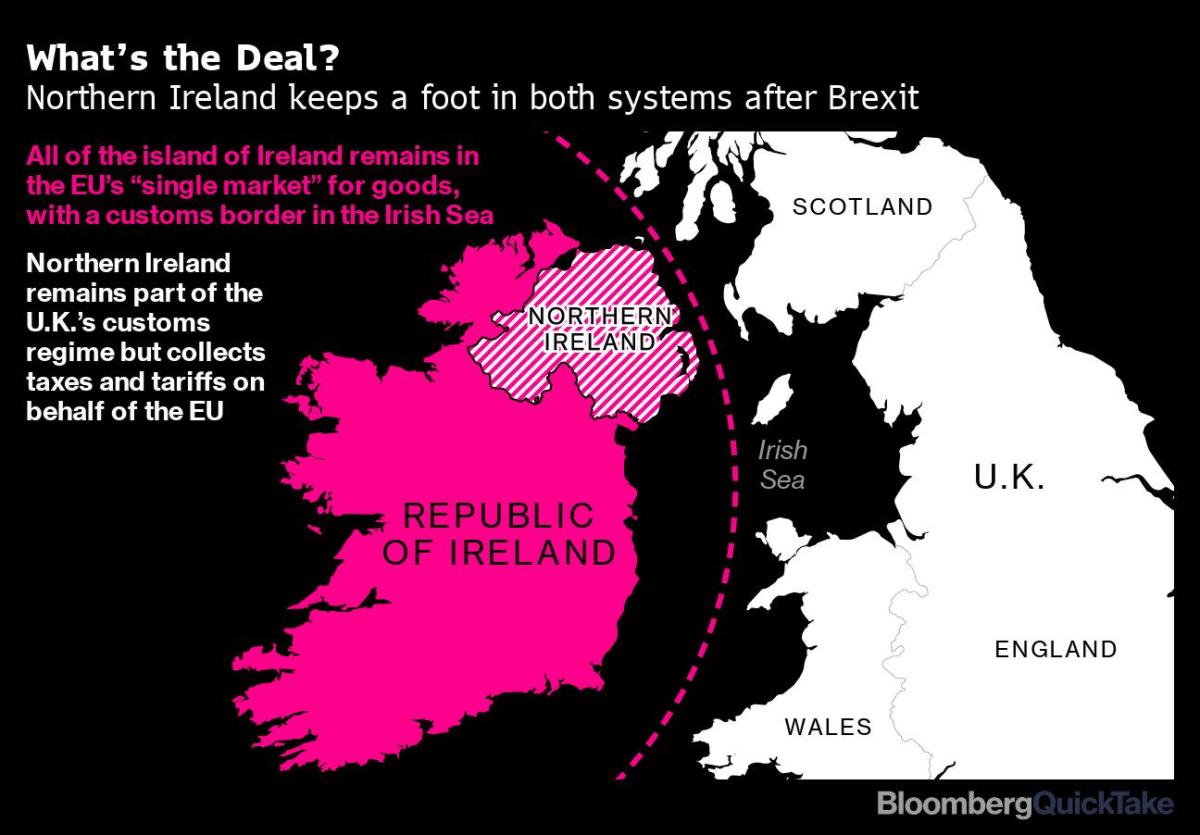
(Bloomberg) — Boris Johnson risks reopening divisions that tore his Conservative Party apart in 2019, with his government set to propose a law that would let UK ministers override parts of the Brexit deal he signed with the European Union.
Most Read from Bloomberg
Northern Ireland Secretary Brandon Lewis confirmed Sunday the legislation will be presented to Parliament on Monday. That was meant to happen last week, but last-minute wrangling between ministers and interventions from pro-Brexit MPs — emboldened by Johnson’s weakened position after he narrowly survived a party confidence vote — led to a delay.
The rebellion by more than 40% of his Conservatives has left Johnson battling for survival, and his response so far appears to be to double down on the most controversial policies rather than seek a broader unity in the party. The government is also pressing ahead with a plan to start deporting migrants to Rwanda this week, against the wishes of some Tory MPs.
UK Foreign Secretary Liz Truss outlined her plan to publish the legislation in a phone call with her Irish counterpart Simon Coveney on Monday. During the 12-minute call held at the UK’s request, Coveney warned the move would be “deeply damaging” to UK relations with Ireland and the EU, according to an Irish foreign ministry statement.
Coveney also accused Truss of not engaging in meaningful negotiations with the EU since February. “Far from fixing problems, this legislation will create a whole new set of uncertainties and damage relationships,” he added.
The British government is “open to negotiations with the EU, but we cannot wait to fix the issues facing the people” of Northern Ireland, Truss said in a tweet after the call.
In tossing red-meat subjects like Brexit and immigration back into the public domain, Johnson may manage to deflect media attention from the country’s economic malaise — as highlighted by a cost-of-living crisis with petrol prices at records and mortgage rates rising, chaos at the nation’s airports, and the train network about to be frozen by a strike. The situation is so bad that the OECD expects the UK economy to show no growth next year, the worst outlook among major nations.
UK Faces Up to a Recession in All But Name as Living Costs Surge
But Brexit is still the totemic issue among Conservatives. In playing hardball with the EU, Johnson will be hoping to win back the support of the most ardent Brexiteers, some of whom abandoned him over a series of scandals including the illegal pandemic parties in Downing Street.
Yet while the legislation may appease some critics, Johnson is already facing a major backlash from Tory MPs appalled that the government is prepared to walk away from an international treaty, and risk further damaging trade with the EU when the British economy is suffering.
‘Damaging’
According to the PoliticsHome website, some lawmakers were sharing a note over the weekend saying that doing so would be breaking international law and “damaging to everything the UK and Conservatives stand for.”
Johnson has called on the EU to agree to rewrite the Northern Ireland protocol, the part of the Brexit deal designed to prevent a hard border on the island of Ireland. The UK agreed to have a customs border between mainland Britain and Northern Ireland, which would remain in the EU’s single market.
Why Are the UK and EU Heading Toward Another Brexit Crisis?: Q&A
The solution was central to Johnson’s pitch in the general election in late 2019, to end the years of Parliament stalemate under his predecessor, Theresa May, with his “oven ready” deal to “get Brexit done.”
In effectively telling Parliament that the deal he signed is not fit for purpose, he’s taking a major gamble. Johnson has accused the EU of implementing the protocol more rigorously than the UK intended, but the premier has never shaken off accusations that he either signed the country up to rules his government didn’t fully grasp, or that he never intended to stick to them.
Clear Warnings
Though Johnson fast-tracked the divorce deal through Parliament, critics were outspoken about the implications for Northern Ireland, where unionists loyal to London balked at the rules being signed up to.
For Johnson, whose career is inextricably linked to the Brexit he campaigned for in 2016 and ultimately delivered as prime minister in 2020, the calculation appears simple. By returning the conversation to the UK’s contentious divorce from the EU, Johnson can remind his party why they voted for him as leader in the first place.
One potential problem is that Tory dynamics and support for Johnson have shifted dramatically in the interim. The slide began with a series of missteps and U-turns last year, including a failed attempt to save a colleague found to have broken Parliament’s ethics rules.
Anger then boiled over due to partygate, the British media nickname for the pandemic rule-breaking in Downing Street that left Johnson as the first sitting prime minister found to have broken the law.
Last week, four in 10 Tories voted to remove Johnson from office, a devastating blow that left him clinging to power.
Clinging On
In a bid to head off some of the Tory criticism building over Northern Ireland, Lewis told Sky News that the planned legislation is “within the law” — though he also said the government has only committed to publishing a summary of the legal advice it has received.
Lewis also declined to say if the bill includes an expected plan to scrap the role of the European Court of Justice in Northern Ireland — an EU red line.
Any efforts to make unilateral changes would provoke the ire of the bloc, even if its initial response may be measured given the law is likely to face pushback from the UK’s upper House of Lords.
US President Joe Biden’s administration has also warned the UK not to do anything to exacerbate tensions in Northern Ireland.
Johnson is also hoping that publishing the legislation will persuade the pro-UK Democratic Unionist Party to restore Northern Ireland’s power-sharing executive and end a damaging political stalemate. But even this is a gamble — the party has made clear it will only respond to tangible changes.
In his last-ditch to Tory MPs before last week’s confidence vote, Johnson warned that kicking him out would mean the return of “hellish groundhog” debates about Brexit. They appear to be happening anyway.
(Updates with Truss-Coveney phone call from fourth paragraph)
Most Read from Bloomberg Businessweek
©2022 Bloomberg L.P.




